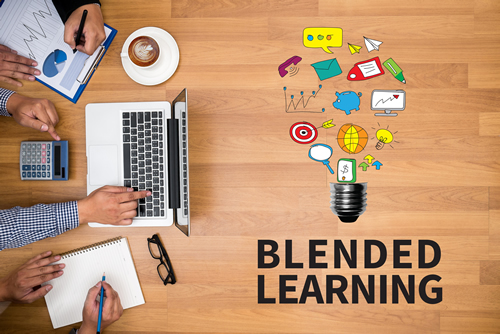In any rush of new technology there comes fresh opportunities for learning and growth that were never possible before. We’ve seen this in the past two decades with blended learning, which combines digital media with traditional classroom methods to engage students like never before.
In all of the excitement to use technology, however, the real purpose of blended learning is often lost. Collaborating on a Google Doc is fun and convenient, but blended learning should be more than that.
Effective blended-learning tools should share a few key characteristics that distinguish them from tools that are simply digital in nature. Before implementing a tool, ask yourself these three questions:
1. How does this tool help students learn in personalized ways that are not possible in a traditional classroom alone?
2. How does this tool empower students to take their education into their own hands?
3. How does this tool tap into the collective knowledge of the global community?
Next page: 4 blended-learning tools
For those who are seeking new ways to use technology in the classroom, here are four tools that take blended learning to the next level.
BLOSSOMS
The Massachusetts Institute of Technology developed a href=”https://blossoms.mit.edu/” target=”_blank”>BLOSSOMS (Blended Learning Open
Source Science or Math Studies) to help students engage in a meaningful way with STEM (science, technology, engineering, and math) subjects.
BLOSSOMS uses free video segments to connect math and science to the real world. Educators and professionals contribute their knowledge and learning to an open database that anyone can access.
“The move is not only aimed at advancing STEM education, but it is also part of an aggressive effort to provide better ongoing professional development for teachers,” says Michael Lauro, associate executive director at Atlantis Charter School.
BLOSSOMS uses a “teaching duet pedagogy” model, in which a teacher will help students solve problems before passing the baton to another teacher for a brief video lesson.
Study.com
Study.com allows independent learners to take their education into their own hands. Through the use of over 22,000 interactive video lessons, students can tailor their courses and learn at their own pace.
According to Chandni Brunamonti of Study.com, teachers can assign lessons to students based on their needs and the core curriculum standards of their state. “The Teacher Edition allows instructors to engage their students inside and outside the classroom with video lessons, customizable courses, virtual classrooms, lesson plans, and more,” says Brunamonti.
Subscriptions also include a career guide that can help students make decisions about where to go to college, what to study, and what careers they might want to pursue.
Study.com does charge a monthly fee, but the courses can earn college credit and work towards a degree.
Pop On
From Wordoor Technology comes an app that allows students to learn a language by connecting directly with tutors from all over the world.
Pop On lets you connect instantly with native speakers from more than 100 different countries and regions. The app is intended to facilitate a global community that allows not only language learning but also an authentic cultural exchange among its 100 million users. Pop On users can learn to understand the way different cultures think, rather than simply memorizing words from a textbook.
Pop On functions through a “sharing economy.” Anyone can sign up to be a paid tutor and instantly begin teaching using training courses provided by Pop On. Tutors can add their own teaching content or adapt the existing courses to the needs of their students. Since you can connect with various tutors instantly, language learners are given the flexibility to learn at their own schedule.
Wordoor Technology recently introduced AI translators to the app so you can communicate with anyone, regardless of your skill level. There are eight languages currently available: English, Chinese, Korean, Japanese, Spanish, French, German, and Russian.
Edmentum
Edmentum focuses on enhancing K-12 education through customizable courses, collaborative group sessions, and real-time analytics. The company has partnered with more than 8,000 school districts and one million educators to engage over 14 million students.
“Incorporating technology into the classroom provides students and teachers with more accurate measurements and personalized learning solutions,” says Tony Skauge, program services manager at Edmentum.
Educators can use a real-time dashboard called Sensei to track student’s progress toward mastery of core concepts that are adapted to each state’s standards. As students practice online, they are guided by built-in tools, immediate feedback, and automatic remediation that is not possible in a traditional classroom alone.
Ninety-four percent of students use their wireless devices for their coursework, and you can arm them with the best resources to do so effectively. Do not fall into the trap of simply digitizing traditional teaching! There are hundreds of great tools out there that can help you take blended learning to the next level in your classroom, and hopefully these four examples will help you to recognize a pattern and identify the best available tools.
- How school leaders can manage and control emotions - May 10, 2024
- A purposeful approach to tech integration - May 9, 2024
- How school leaders can foster a culturally responsive framework - May 9, 2024

